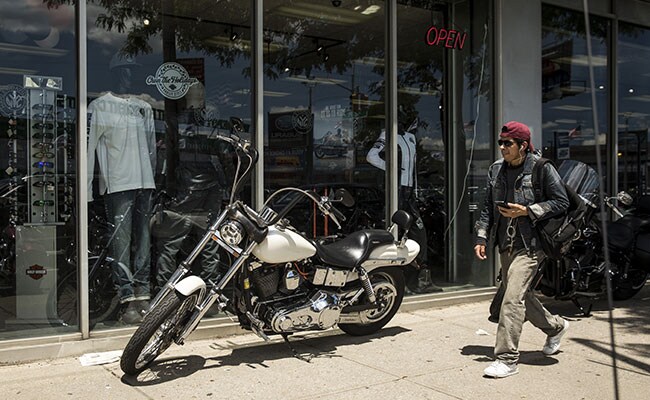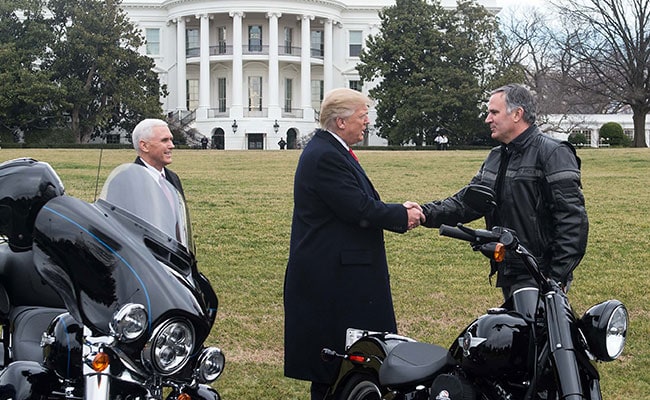
- Donald Trump said it was "the beginning of the end" for Harley-Davidson
- Harley-Davidson may incur $45 million additional cost due to trade wars
- They are looking for new markets as motorcycle sales dip in US
President Donald Trump lashed out at Harley-Davidson on Tuesday over the company's decision to move some production outside the United States, calling it "the beginning of the end" for the iconic motorcycle maker and threatening to respond with punishing taxes.
In a fusillade of tweets beginning shortly after 7 a.m., the president accused the company of using European tariffs as an excuse for manufacturing changes it already had planned; erroneously said Harley had shifted operations from a Kansas City, Missouri, plant to Thailand; and demanded that its famous bikes "never be built in another country-never!"
White House aides say the president feels betrayed by the iconic American manufacturer's decision to move some production offshore to avoid becoming embroiled in Trump's trade war with Europe.
His aggrieved tweetstorm - echoed in subsequent comments at the White House - made it clear that he took Harley's action personally. But the outburst also reflected a president grappling with the effect of policies he expected to produce a more favorable outcome, say trade experts.
Early this year Harley-Davidson said they would move much of their plant operations in Kansas City to Thailand. That was long before Tariffs were announced. Hence, they were just using Tariffs/Trade War as an excuse. Shows how unbalanced & unfair trade is, but we will fix it.....
— Donald J. Trump (@realDonaldTrump) June 26, 2018
Trump's tariffs on steel and aluminum will cost Harley up to $20 million this year, with European Union retaliation adding perhaps an additional $45 million, the company said.
....When I had Harley-Davidson officials over to the White House, I chided them about tariffs in other countries, like India, being too high. Companies are now coming back to America. Harley must know that they won't be able to sell back into U.S. without paying a big tax!
— Donald J. Trump (@realDonaldTrump) June 26, 2018
Trump's sudden feud with Harley - an American manufacturer he feted at the White House just last year - pitted a company driven by financial calculation against a businessman president who takes a deeply idiosyncratic and emotional view of global commerce.
A Harley-Davidson should never be built in another country-never! Their employees and customers are already very angry at them. If they move, watch, it will be the beginning of the end - they surrendered, they quit! The Aura will be gone and they will be taxed like never before!
— Donald J. Trump (@realDonaldTrump) June 26, 2018
In one Tuesday tweet, Trump suggested that Harley was motivated by a hidden agenda, writing: "Harley must know that they won't be able to sell back into the U.S. without paying a big tax!" Harley has announced no such plans.

Harley-Davidson's decision to move its production of motorcycles bound for European customers demonstrated the costs of the president's "America First" trade policies (AFP)
"It reveals his misunderstanding or lack of knowledge about the way global supply chains work and the way production works," said Philip Levy, a White House economist in the George W. Bush administration. "There's no evidence that the president's very unorthodox approach to trade negotiations is achieving any results - other than more protectionism."
While the president complained Tuesday about Europe's trade barriers, he has not pursued negotiations toward a new treaty that might have eliminated those facing Harley. The EU and Japan, meanwhile, have concluded a trade partnership that will give Harley's Japanese rivals better access to the European market.
Trump also withdrew the United States from a Pacific trade accord that would have cut tariffs in key Asian markets, a move Harley said forced it to open the plant in Thailand to serve fast-growing markets nearby.

Donald Trump's sudden feud with Harley - an American manufacturer he feted at the White House just last year - pitted a company driven by financial calculation against a businessman president who takes a deeply idiosyncratic and emotional view of global commerce (AFP)
The president's ire at the Milwaukee-based company, famous for heavy motorcycles known as "hogs," had its origins in Trump's belief that he and his heartland supporters share a unique bond with the company.
"I don't think he's a bike guy. The wind in the hair is not going to work. But that is a demographic of the country that he relates to, guys who ride Harleys," said Barry Bennett, a former Trump campaign adviser, said of the president.
Trump was aboard Marine One late Monday afternoon, flying over the Potomac River toward Joint Base Andrews in Maryland, when he pecked out a tweet accusing Harley of becoming "the first to wave a White Flag" in his blossoming trade war with Europe.

Donald Trump's ire at the Milwaukee-based company, famous for heavy motorcycles known as "hogs," had its origins in Trump's belief that he and his heartland supporters share a unique bond with the company (AFP)
The president then boarded Air Force One to South Carolina, where he held an especially raucous campaign rally. Joining him for the flight was Peter Navarro, director of the White Houe Office of Trade and Manufacturing Policy and arguably the administration's most outspoken advocate of its "America First" trade stance.
The plane circled over West Columbia, South Carolina, for 57 minutes waiting out a thunderstorm, giving the president, Navarro and the other aides on board ample time to absorb the news coverage about Harley. Onstage, Trump gave a shout out to "the great Peter Navarro," adding playfully that he "does like tariffs."
In his freewheeling speech, Trump said nothing about Harley but described the United States as being ripped off by its trading partners.

Donald Trump last year welcomed Harley executives and workers to the White House, celebrating the company for making its products in the United States. In this photo, he is seen shaking hands with Harley-Davidson CEO Matthew Levatich (AFP)
Tearing into Germany, he said, "They send Mercedes, they send BMWs, they send everything; we tax them practically nothing."
The president did not mention that BMW is one of South Carolina's largest employers, manufacturing its popular X-series SUV there.
Trump last year welcomed Harley executives and workers to the White House, celebrating the company for making its products in the United States. The company still makes most of its motorcycles at American plants in Pennsylvania and Wisconsin.
Trump feels betrayed by Harley's decision, believing that the company leveraged his political brand to sell more bikes following a 2017 White House event that featured the president mixing it up with executives and workers, according to one person familiar with the president's thinking who spoke on the condition of anonymity to reveal private discussions.

With motorcycle sales slumping in the United States, Harley-Davidson has been eager to expand its overseas business (Reuters)
"Harley-Davidson is using that as an excuse," Trump said of the European tariffs. "I don't like that, because I've been very good to Harley-Davidson, and they used it as an excuse. And I think that the people that ride Harleys are not happy with Harley-Davidson, and I wouldn't be, either."
With motorcycle sales slumping in the United States, Harley has been eager to expand its overseas business. The company has plants in India, Brazil and Australia, where production for its European customers will eventually move.
The new plant in Thailand, expected to begin production later this year, will serve customers in Asia. The plant in Kansas City that Trump wrongly said would see its work shifted there actually is being closed as part of a reshuffling that will move production to York, Pennsylvania. The move involves a net loss of about 350 jobs.
"We see tremendous opportunity, particularly in Southeast Asia. And the investment in the plant in Thailand to get around the egregious tariffs and duties is a part of accessing a very important market," chief executive Matthew Levatich told investors in an April conference call.
European retaliation for Trump's metals could add up to $45 million to Harley's costs this year, which works out to an extra $2,200 for the average motorcycle and explains why the company is shifting production of bikes bound for Europe to a foreign facility.
Harley's net income has slid for three consecutive years; last year's $594 million in profits were down nearly 30 percent from 2014.
Aides said the Trump tried to communicate a broader message - or threat - with his Tuesday tweets: Companies should grow their businesses in America.
"The president's overarching message is: Bet on America; we're a strong economy; we have the best workers; we have the best regulatory tax," a senior White House official said. "He's telling Harley-Davidson and the rest of the world, if you make decisions to go elsewhere, it's going to be a problem for their business."

European retaliation for Trump's metals could add up to $45 million to Harley's costs this year, which works out to an extra $2,200 for the average motorcycle and explains why the company is shifting production of bikes bound for Europe to a foreign facility (Reuters)
Trump's angry insistence that Harley's products should be made in the United States is at odds with his own record as a businessman. His branded products - clothing, vodka, home goods and hotel amenities - were manufactured in at least 12 countries outside the United States, including China, Mexico and Indonesia, according to a 2016 Washington Post analysis of publicly available data.
Likewise, Ivanka Trump, the president's daughter and unpaid White House adviser, sourced her company's products exclusively from low-wage factories in countries such as Bangladesh, Indonesia and China, The Washington Post found.
Trump's stated goal of increasing opportunities for American factory workers is at odds with his zero-sum view of how corporations should operate, said Matthew Slaughter, dean of Dartmouth College's Tuck School of Business. Multinationals that expand abroad, such as Harley, typically add jobs to their U.S. operations, he said.
"I believe he is earnestly committed to helping workers at Harley-Davidson and elsewhere," said Slaughter, a former White House economist in the George W. Bush administration. "Yet the policy proposals reflect a fundamental misunderstanding about how many jobs in American are connected to the world."
(Except for the headline, this story has not been edited by NDTV staff and is published from a syndicated feed.)Track Latest News Live on NDTV.com and get news updates from India and around the world

